Concerns over Mandatory Halal Certification
Entrepreneurs are pressured by the mandatory halal certification regulations. The costs associated with obtaining halal labels are considered expensive, and the procedures are complicated.
maaf email atau password anda salah

Entrepreneurs are pressured by the mandatory halal certification regulations. The costs associated with obtaining halal labels are considered expensive, and the procedures are complicated.

The professorship of various public figures and officials appear to be problematic. Their titles were earned thanks to certain assessors and predatory journals.
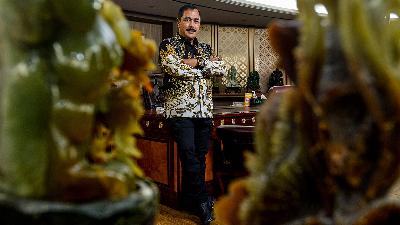
Immigration and Penitentiary Affairs Minister Agus Andrianto on the issues ranging from the inmate escapes from Salemba Detention Center to Mary Jane’s repatriation.

Muhammadiyah withdrew trillions of rupiah from Bank Syariah Indonesia. It was the accumulation of various problems, from operational matters to appointment of commissioners.

Narendra Modi is likely to serve his third term as the Prime Minister of India. His campaigns are based on populism and religion.

Gerindra Party Executive Chairman Sufmi Dasco Ahmad gives his explanation about the preparation of Prabowo Subianto’s cabinet ministers.
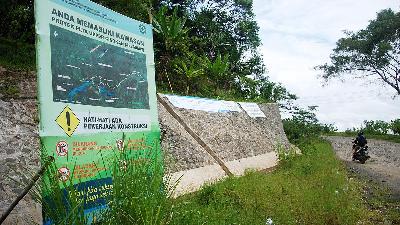
Indonesia’s first pumped storage hydroelectric power plant will generate 1,040 megawatts, the largest capacity in the country.

Clarification of Glenn Hurowitz from Mighty Earth over the conservation of Tapanuli orangutans being endangered by the construction of Batang Toru hydropower plant (PLTA) in North Sumatra.
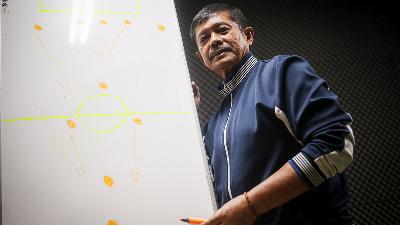
Head Coach of SEA Games National Soccer Team, Indra Sjafri, on his game strategy and the target for the 2034 World Cup.

The conflict in Papua has created a seemingly unending wave of refugees. Several children have died of malnutrition.

The health ministry and the Food and Drug Monitoring Agency failed to anticipate acute kidney injuries in children. The pharmaceutical companies involved must be heavily punished.

Sudrajad Dimyati once failed to make Supreme Court justice because of a bribery scandal in a restroom inside the DPR building. His wealth multiplied when he became a high court judge.
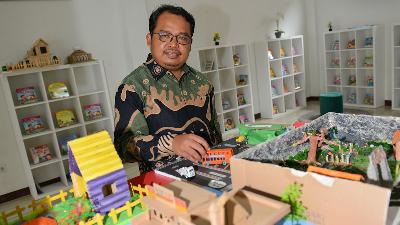
Is it true that Putri Candrawathi has not been detained because she still has to care for her (underage) child? KPAI answers.
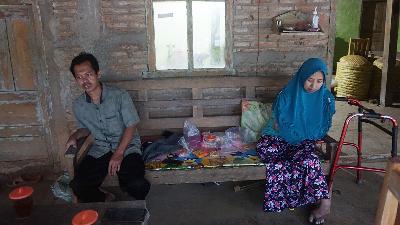
ACT’s fundraising campaigns are believed to be exaggerated and inaccurate. Large percentages are taken from donations.

Gerindra Party cadres start campaigning for Prabowo Subianto as a presidential candidate. They attract millennial voters through gimmicks on social media.

Crazy rich from Pluit, North Utara, Rudy Salim, is dragged into the binary option fraud case after suspected fraudster Indra Kenz bought a Lamborghini Huracán from his luxury car showroom Prestige Motors. The Lamborghini imported under the ATA Carnet system was not for sale.

Sexual violence and trafficking of children have been on the increase in the last three years. The government and law enforcement authorities must be more serious in eradicating these crimes.
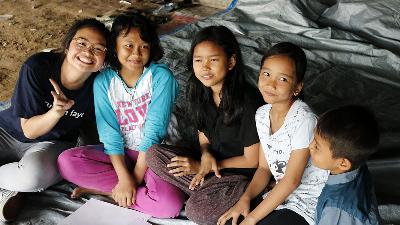
Faye Simanjuntak sets up Rumah Faye focusing on rescuing Indonesian children from human trafficking, violence, and exploitation. She uses her privileged background for good deeds.

Chairman of Indonesian Pediatric Association (IDAI) Aman Bhakti Pulungan is concerned about the rising cases of Covid-19 among children in Indonesia. According to IDAI’s record, around 117,000 children have been infected since the pandemic struck. Children makes up 12.5 percent of the total cases. Aman says children are most vulnerable to the disease via their parents and the people around them. He observes that many pediatric patients with Covid-19 go to doctors rather late rendering the doctors unable to offer maximal treatment. Given the recent surge in the cases, Aman urges the government to put on hold face-to-face classes scheduled to resume in July.

Suharto’s children made the Berkarya Party into a family political vehicle. They are deemed to have not run it seriously.

Following involvement of police officers, prosecutors and attorneys, the Joko Tjandra scandal has now spread to the Supreme Court. This shows the never-ending decay of our judicial system.

Criminal fugitive in the case of the Bank Bali payment rights, Joko Soegiarto Tjandra, was brought back to Indonesia by the police on Thursday, July 30.

As the Covid-19 pandemic continues to restrict major public activities, the government predicts the national economic growth to take a nose dive to minus 4.3 percent in the second quarter. “For the most part, the drop is attributed to a sharp decline in consumer spending,” said Finance Minister Sri Mulyani Indrawati, 57, during a special interview with Tempo on July 17.
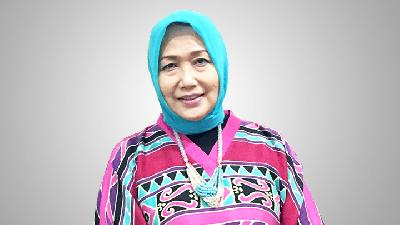
Bank Bali fugitive Joko Soegiarto Tjandra’s return home in July caused public uproar. His lawyer, Anita Kolopaking, explained why Joko prefer to stay in Malaysia.
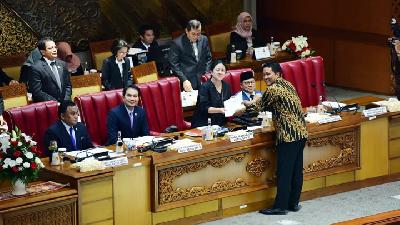
The government is using various methods to curb rejection of the omnibus draft bill. Social media activists and labor organizations were approached.

Ma’ruf Amin’s children entered politics after their father was elected vice president. Some have been approached by businessmen wanting to gain access to Ma’ruf.
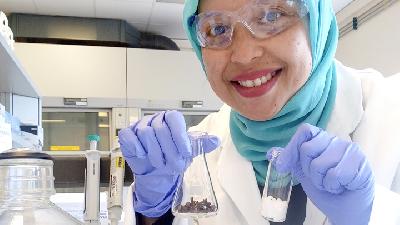
Indri Badria Adilina finds raw materials for industrial products processed from local natural resources. Her discovery may be an answer to reducing reliance on imported catalysts.
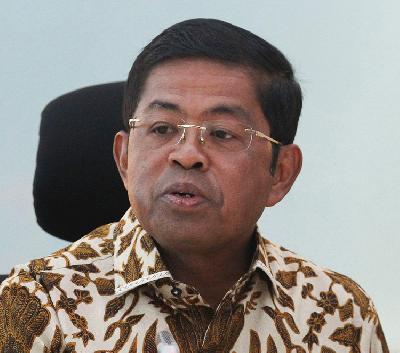
IDRUS Marham made quite a surprise by resigning from his position as Social Affairs Minister, last Friday afternoon, at the Presidential Palace.
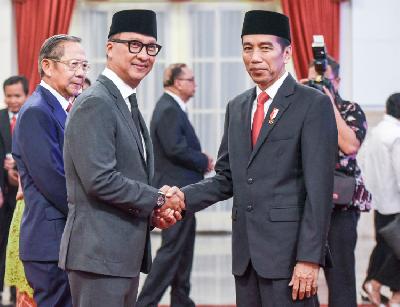
Golkar had been preparing candidates to replace Idrus Marham back in mid-July. Agus Gumiwang beat out two other candidates.
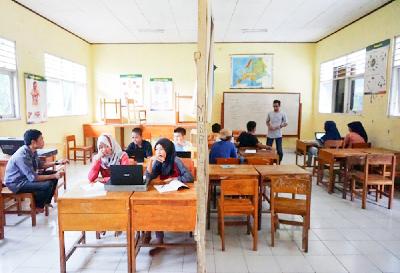
Every weekend, children from three islands in the Pangkep Regency, South Sulawesi, gather on the beach to welcome the Floating School.
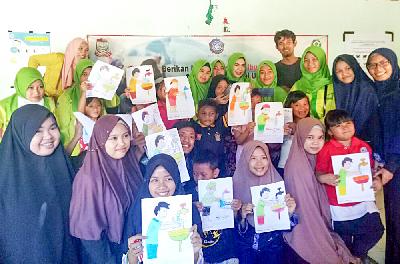
Achieving educational equity in Indonesia faces several hurdles, including limitations in infrastructure, educational facilities, and qualified instructors. These poor conditions have inspired several youths to act. Young people have opened classes in several provinces, including in the city of Makassar, South Sulawesi. In Pangkep, also in South Sulawesi, three youths pioneered the Floating School, a program meant to reach children living on small islands. Tempo English reports.

SANDIAGA Salahuddin Uno accepted a new duty last February: becoming Chair of the Gerindra Party 2019 Presidential Election Campaign Team. Sandiaga, 48, was personally appointed by Prabowo Subianto, the party's general chair.

One day after his inauguration as the new social affairs minister last Wednesday, Idrus Marham immediately went to work.

Sartono Kartodiredjo’s dissertation Pemberontakan Petani Banten 1888 (The Peasants’ Revolt of Banten in 1888) and Catatan Harian Imam Samudra (Imam Samudra’s Diaries) were two texts that significantly influenced Jompet Kuswidananto’s work On Paradise, exhibited at the Museum of Contemporary Arts, Grand-Hornu, Belgium.

Sri Mulyani Indrawati

The Indonesian government mandates a 12-year compulsory education starting at the primary school level. But there is no similar invocation for early childhood education, a process experts say is crucial to children’s development. According to the Ministry of Education, over five million children in Indonesia have no access to pre-schools (PAUD—Early Childhood Education School). The concern is particularly pressing in Belu Regency—a region that borders Timor-Leste—where there is limited access to quality education. There are only 158 PAUDs for Belu’s 27,000 children, and only 5,000 have enrolled. Save the Children, a non-profit organization, has joined hands with the government and locals, and launched a program in 2014 to improve the regency’s early childhood education. In July, Tempo English visited the Belu Regency in East Nusa Tenggara.

Indonesia was featured as the 'country of focus' at the 8th Asian Festival of Children's Content held in Singapore, where dozens of writers, illustrators and publishers from Indonesia spoke about the archipelago's rich tradition of children's literature. The country has the potential to successfully enter the international market.

REELECTED as a Golkar legislator in 2014, Fayakhun Andriadi is a member of Commission I, in charge of information, defence and foreign policy, in line with his background in information technology.

Sex tourism is quietly flourishing in many Indonesian cities, bolstered by the Internet, which enables widespread promotion overseas. In a world of anonymity, children are the victims.

Close to half a million Indonesians go to work in Malaysia every year, according to data from the National Agency for the Placement and Protection of Indonesian Migrant Workers (BNPPTKI). Many bring along their families to work at sites which are often located in remote areas, far from life's basic facilities. In Sabah, more than 53,000 children between the ages of one to 18, lack access to education. Thanks to former migrant worker Veronika Sedo Barek, who first opened community learning centers in Sabah, there are now 219 such schools over there. Meanwhile, an NGO known as Volunteerism Teaching Indonesian Children sends volunteers to teach migrant workers' children in Sarawak. A Tempo English report to commemorate International Day for Migrant Workers on December 18.

President Joko Widodo's decision to appoint Ignasius Jonan as energy and mineral resources minister and Arcandra Tahar as his deputy is bewildering and worrying. The public will find it very difficult to understand the confusing reasons behind it.
Jonan, with his background in finance and capital markets, has no competency or experience in energy. He successfully managed state-owned railroad company Kereta Api Indonesia, and many hoped for great things when President Jokowi named him his transport minister. But he only lasted 20 months in the cabinet. This shows that the president judged Jonan not good enough to continue as a minister.

Left-behind Children
The 2004 tsunami disaster and other conflicts in Aceh caused many children to lose their parents. SOS Children's Villages helps place them with new families.
IN front of his house, Wahyu was absorbed in a card game with Farhan, a friend of similar age. Once in a while, the seven-year-old shouted, "You lost!" Farhan would respond similarly at other moments. Inside the house, their foster mother Nurjannah and her older children were preparing lunch.
"Wahyu has been here for two and a half years," said Nurjannah when Tempo visited her home three weeks ago. The 35-year-old woman is the foster mother who takes care of Wahyu and his new 'siblings'. The family came together with the support of the SOS Children's Villages foundation. Headquartered in Austria, SOS Children in Aceh has a house at Lamreung, Greater Aceh Regency.

The time given to investigate the claims of drug lord Freddy Budiman that he channeled money to senior police officers was too short. National Police Chief Gen. Tito Karnavian assigned only one month to look into this serious and disturbing allegations of a drug kingpin prior to his execution. The team consisting of independent members was terminated around mid-September, just as it began to uncover the money trail to a number of police officers.
The police chief can actually do much in the effort to seek the truth. He could extend the investigation time, or he could form a task force to follow up on the findings of the first team. He could also use the momentum to clean house. After all, rumors have been rampant that some members of the police forcelike those in other law enforcement agencieswere in or behind the drug businesses.

Though he has decided to tell his tale, Chandra Halim, alias Akiong, will not talk to just anyone.
Sentenced to death for his role in a drug smuggling case, he remains adamant he will not talk to police officers. Akiong is only willing to talk to people representing the public interest regarding the Freddy Budiman Testimony Fact-Finding Team. "That's because he wants to talk freely," Setara Institute team member Hendardi said last Thursday.

The government is lobbying the DPR to expedite the reappointment of Arcandra Tahar as energy and mining minister. His accelerated naturalization process has raised questions.

The Presidents aides are lobbying lawmakers to approve Arcandra Tahars citizenship reapplication, so he can be reinstated as energy and mineral resources minister.

ARCANDRA Tahar has been relieved from the post of energy and mineral resources minister for holding a United States passport.

Producing false vaccines is a crime against humanity. After a space of 13 years, many parents who expect their children to be immune to diseases such as measles and polio are now given the bitter truth. The vaccines injected into the bodies of their infants or given orally fail to provide that immunity. In fact, those vaccines actually endangered their infants' health.
It is not because they contained 0.5 cc of liquid antibiotics unrelated to the infants' immunity, it is also because the production process used failed to use sterile equipment. The manufacturer admitted to inserting bogus liquid vaccines into used bottles of authentic vaccines, obtained from hospitals. Clearly, these fake vaccines contained a variety of harmful contaminants.

Mochamad Awam Prakosa loves little children. He also loves fairytales. In 1999, the 44-year old got laid off from his banking job. He has dedicated his time storytelling from kindergarten to kindergarten ever since.
On May 18, 2009, he launched Kampung Dongeng ('Storytelling Village'), a group dedicated to storytelling in different regions throughout the country, especially at relocation centers in disaster-prone areas. "Children can play and become more purposeful during our events. They're not neglected, and they don't have to resort to go begging in the streets," said Awam, the father of three children.

Two months before he retires, National Police Chief Gen. Badrodin Haiti is busy answering questions about who his successor will be. The former East Java provincial police chief is also accused of lobbying for an extension of his term of office.
Badrodin said he was troubled by charges that he desperately sought to stay on in his current job. The decision whether to extend his term or have him replaced is entirely up to the President. "To me, this position is a mandate," he said.

Minister for Women's Empowerment and Child Protection Yohana Susana Yembise, 58, cannot afford to take it easy yet, even though Law No. 35/2014 is ready to be enacted. Better known as the Bill on Castration, this piece of legislation will soon be deliberated on at the House of Representatives (DPR).
The bill was drafted by three ministries at the instruction of President Joko Widodo as a response to the emerging cases of sexual abuse. The ministries involved are the ministries coordinating human development and culture, social affairs and women's empowerment and child protection. "The President has instructed the attorney-general and me to monitor the passage of the bill," said Yohana in a recent interview.

Women's participation in politics in Indonesia is still low. The number of female legislators in the House of Representatives (DPR) for the 2014-2019 term is only 97, or 17.32 percent of the total number of parliamentarian seats. This is what is making Indonesia's legislature and policymaking not pro-women and children.
Heru Prasetyo Kasidi, the deputy minister in charge of gender issues at the women's empowerment and child protection ministry, called for an increase of women in the legislature. He said the government was attempting to raise the participation of women in politics through a variety of training programs. "Ideally, women should have a more equal role to men in the public sector, including in politics and development," said Heru.

I must have rushed through the port of Banyuwangi a hundred times over the past 45 years. The first time was in 1971 when I waded through surf to board a rusty LCU from World War II to cross the Bali Strait to Gilimanuk, at the time just a one-ferry port. The old amphibious landing craft lurched to a stop on the sandy beach beside the single pier. In the shadows, a bemo (three-wheeled motorized vehicle) driver waved and I climbed in for the lonely, all-night drive to Denpasar.
Sometimes I'd stay a few days to take note of how this underrated, curious city has grown and changed over the years. Depending on your perspective, Banyuwangi sits either at the beginning or the end of Java, it is the most easterly major town and the last stop on the railway network that meanders across the island. The administrative capital of Banyuwangi regency, it has a population of around 110,000.

SHANDRA Woworuntu still remembers the day she received an email from the office of President Barrack Obama in September 2015, offering her to become a member of the US Advisory Council on Human Traffickingthe first of its kind. The email also requested for her biodata.
For a long spell, Shandra was in a state of disbelief. "I didn't even pay attention to it," recalled the 39-year-old resident of New York City three weeks ago. She sent in her data only after she was convinced that the email was indeed from the White House.

THE January 14 bomb attack on Jalan Thamrin in Central Jakarta confirmed National Police Chief Gen. Badrodin Haiti's belief that the police are now the terrorists' prime target. One police officer was wounded in the explosion and four others suffered serious injuries from gunshot wounds.
One of the officers, First Adj. Insp. Budiono, sustained three close-range gunshot wounds. He narrowly escaped death after laying unconscious for three days at the hospital. "That was incredible. His heart had even stopped," Badrodin said.

Irendra Radjawali, 39, came to a coffee shop in Central Jakarta wearing a blue t-shirt and a pair of khaki shorts. "I'm not a suit-and-tie type of person," said Radja, as he is known by family and friends, apologizing for his informal clothing. He looked energetic despite having flown to Jakarta that morning from Pontianak, West Kalimantan. Radja explained that he had just spent four days in Kalimantan to operate drones used to assist in spatial mapping in the area.
The drones are all designed by Irendra, who currently works as a researcher at Bonn University in Germany. He consulted what he called the best university on earthYouTube videosto learn how to make his own drone three years ago. And this came about after his research work, collecting data from the Kapuas River in West Kalimantan.

THE five members of the Die Linke faction of Germany's legislature could not contain their curiosity. The democratic socialist legislators sent Germany's Federal Intelligence Service (BND) a letter. In it, they questioned that institution's involvement in the events of September 30, 1965, in Indonesia, in the total destruction of the Indonesian Communist Party (PKI), as well as in Sukarno's ousting from the presidency.
The politicians, who included Andrej Hunko, Jan van Aken, and Sevim Dagdelen, acted after German media had reported their government was involved in the bloody events in Indonesia in 1965. German media also reported on a planned international court trial at The Hague in the Netherlands this October concerning the 1965 events.

A telegram dated November 1, 1965, was sent from Ambassador Marshal Green from Jakarta to Secretary of State Dean Rusk in Washington, D.C. Ambassador Green reported that a senior Indonesian Army officer had requested a supply of medicines, tactical communication equipment and small-caliber weapons.
The officer referred to in that telegram was Brig. Gen. Achmad Sukendro, a state minister on loan to the First Dwikora Cabinet presidium. He was known for being the right-hand man of Gen. Abdul Haris Nasution in intelligence matters.

Differently-abled children need special handling so they can become self-reliant. And they should never be excluded. "Their feelings should be considered," said Ignatius Dharta Ranu Wijaya, better known as Dharta. As a consultant on the Education and Behavior of Children with Special Needs, Dharta works at the Child Neuro Behavior Development Center of Melinda Hospital in Bandung, West Java.
He noted that one of the major problems of the diffabledaside from the physical factoris an ill-prepared educational system and an erroneous pattern of nurturing. Dharta, 43, began his career as a behavioral therapist for children with special needs in 1998. Today his expertise is in great demand by a number of well-known non-government organizations (NGOs), schools and universities.

Nuraeni, wife of the late Hendra Gunawan, flips through the book, Hendra Gunawan-Sang Pelukis Rakyat (Hendra Gunawan, the People's Painter), looking vibrant. Sixty-eight years old, she has fasted every day during the fasting month of Ramadan. When Tempo met at her house in Bandung, West Java, she discussed the paintings in the aforementioned book.
"I am still 100 percent certain they are originals," she said, adding that the book was a tribute to her husband, who died in Bali at the age of 65 in 1983. "I have been holding on to these letters all this time," she said, referring to the poems and love letters that are also published in the book.

DAHLAN Iskan pulled a disappearing act recently and was unable to be contacted by the media, right after his indictment in the graft case involving the state-run power company PLN's 21 relay stations in Java, Bali and Nusa Tenggara provinces. Dahlan, who was PLN CEO at the time, chose to respond to reporters' questions via his personal website, gardudahlan.com, which he launched last April. Through the site, he also announced the appointment of Yusril Ihza Mahendra to represent him as his attorney. The following are Yusril's responses to questions asked by Tempo reporter Istman Musaharun, last week.

SINCE Mary Jane Veloso was arrested in Yogyakarta, Floramay Ladrillano often recalls the day Mary Jane left the Philippines. As her neighbor at Esguerra village in Talavera, Floramay knows well the ways of Mary Jane, always taking her eldest son Mark Daniel to school every day. "She really took care of her children's education," Floramay told Tempo contributor Suryo Wibowo, last week.
Later in the day, Mary Jane and her husband Michael Candelaria would go around the village selling plastic household goods. Mary Jane was always cheerful, always greeting her neighbors. "She liked to say good morning or good afternoon," recalled Floramay, 29, a cousin of Michael and an elementary school teacher. But Mary Jane's and Michael's business did not go well. She was offered a chance to work in Malaysia by a neighbor, Maria Cristina Sergio.

Drone or unmanned aerial vehicles (UAV) has become an important information component. Taking photographs or mapping from a certain height no longer needs the services of an aircraft or a helicopter, which tends to be very expensive.
This crew-less aircraft has become a trend among technology nerds. One of them is Riza Muhida, a robotic expert from Surya University. He is currently completing the production of a military drone fueld by solar power. This drone is 2.5 meters in diameters. "Our target is to have it done by end of the year," said 46-year-old Riza. Satwika Movementi and Syari Fani from Tempo interviewed Riza, a graduate of Osaka University by telephone in April, on two separate occasions. Excerpts:

AWARE of the tide of public opinion against Police Comr. Gen. Budi Gunawan, newly installed National Police Chief Gen. Badrodin Haiti hurriedly swore him in as his deputy last week. The closed and hush-hush affair took advantage of a major public distraction, the Asia-Africa Conference.

Clean and potable water do not come easily to Indonesians. So far, according to the Mineral and Natural Resources Ministry, only 68.9 percent of the population have access to clean water while only 20 percent get potable water. Given the government's inability to provide water supply, the poor are usually the worst off. "To meet basic needs, the government is able to provide the poor with rice, but with water? No such program exists," Roh Santoso Budi Waspodo, 52, who teaches hydrology at the Bogor Institute of Agriculture's Faculty of Civil Engineering and Environment told Tempo English.
Roh is quite familiar with problems relating to clean water supply. In the 2000s, he initiated a clean water project in Banten. He assisted the Public Works Ministry to supply potable water in coastal areas and small islands from 2004 to 2005. Besides teaching, one of his activities is to map out water sources for a private company. According to Roh, there are alternative ways to access clean and potable water. "We should not be dependent on the state-run water supply company," he urged. Contributor Lina Wulandari interviewed Roh two weeks ago.

Although it had been formalized last January, the National Mid-Term Development Plan (RPJMN) 2015-2019, a product of the National Planning and Development Board (Bappenas), still came under the public spotlight. The exclusion of a number of visions and missions of President Joko Widodo and Vice-President Jusuf Kalla during the election campaign came under sharp criticism.
But Bappenas Minister Andrinof Chaniago played down the criticism. He said the development plan was based on the government's work program for the next five years. "Those criticisms are just political maneuvers," Andrinof told Tempo reporter Firman Hidayat last week.

Stepping into the World Bank headquarters on the corner of 1818th and H Street, Washington, D.C., was like stepping into a big, busy, elaborate machinery with numerous fast-moving parts, security checks and all. It was dizzying and even mildly stupefying. Amidst the ocean of hard-focused and extremely nimble individuals clad in black, World Bank Managing Director Sri Mulyani Indrawati-who at the time of the interview was wearing a blue batik print blouse and an easy, genial smile-was, oddly enough, a rather soothing presence.

IN its first year of operating the national health insurance program, the healthcare division of the Social Security Agency (BPJS Kesehatan) is paying out more money than it makes. The claims are turning to be greater than the number of premium-paying subscribers. But Fahmi Idris, the agency's president director is confident that the company will not go out of business. In an interview with Tempo last week, he explains why.

COMR. Gen. Badrodin Haiti has not been in a good mood this past month. As deputy police chief he was given the responsibility to lead the police force, which is currently in a conflict with the Corruption Eradication Commission (KPK), following the indictment of the new police chief-designate, Comr. Gen. Budi Gunawan. Last week, he came to the Tempo office to 'relax and laugh a bit'.

It has been 30 years since Sudradjat 'fell in love' with coconuts. The thesis and dissertation of this lecturer of Agronomy and Horiculture at the Bogor Institute of Agriculture (IPB) were all about coconuts. He claimed to have been attracted to the philosophy of the cocounut tree-also known as 'the tree of life'. The coconut can grow anywhere and it has become, "the symbol of beauty in the tropics," said Sudradjat.

The sound of children's laughter wafted out of the house on Jalan Soekarno Hatta in East Alok subdistrict, Sikka regency. Twenty children were sitting around a large table. Katerina Dua Yovin, 16, straightened up and raised her hand. The other children fell silent.
Yovin, as she is known, began with a story about her neighborhood in Alok, where there were still many parents who beat their children for not doing their homework. "Have you experienced the same thing?" she asked. Alvira Novitasari raised her hand. "I did," she said. "The child is naughty, so he must be beaten."
Laura Maria Geane, another 16-year-old girl, asserted that parents should never beat a rebellious child. "Parents are bound to give a warning, but that should not necessarily be coupled with violence!" she exclaimed as the others applauded.

THE office of the Mega Maroci Lines shipping company at the Menara Kuningan building in South Jakarta is guarded by a sophisticated security system. Last Tuesday, after Tempo interviewed Abdullah Mahmud Hendropriyono, CEO of Mega Maroci, he pressed his thumb to the sensor, which immediately showed his initials 'AMH' and the wooden door to his office opened up.
Business and politics are two major activities of Hendropriyono after he retired from his job as director of the State Intelligence Agency (BIN) at the end of 2004. At the end of his three-year term as leader of BIN, pro-democracy activist Munir Said Thalib was mysteriously killed by arsenic poisoning. Some indications point to BIN's involvement in the crime and since then, Hendropriyono's name has always been linked to that incident.

ONE month after he was appointed coordinating minister for maritime affairs and fisheries, Indroyono Soesilo's working hours have stretched late into the night. Perhaps it's because he is, so far, the only official coordinating minister. "I'm the only who has received his marching orders, the other coordinating ministers are still awaiting theirs," he said when he met the Tempo team two weeks ago.
Indroyono's office, located at the Agency for the Assessment and Application of Technology (BPPT) building in Central Jakarta, is not unfamiliar to him. From 1997 to 1999 he worked there as the BPPT deputy director in charge of natural resources. Today, he occupies the huge office of the former BPPT chairman, Bacharuddin Jusuf Habibie, the last vice president in the New Order era and the first president to launch the reformasi era. "No one dares to occupy this office, they're all afraid," he joked, in explaining how he ended up there.
In the media flurry of profiling President Joko Widodo's new cabinet members, Indroyono appears very subdued and conservative compared to the flamboyant and unconventional Maritime Affairs and Fisheries Minister Susi Pudjiastuti. But there's no question that Indroyono is the man to watch as he is the one tasked with implementing the major changes charted by President Jokowi.

Pumping up Jembrana's Cacao
Kerta Semaya Samaniya is the first UTZ Certified cooperative in Indonesia. Its farmers have cut out the middlemen.
Banana, coconut and dapdap (Erythrina spp) trees form a protective barrier around Nyoman Astrawan's cacao plantation in Candikusuma village, Bali. The thick foliage shields the area from the sweltering heat of the sun. In the middle of the site, cacao trees stand in neat rows. No weeds grow on the one-hectare plot of land. "My cacao plants are more robust. The soil isn't apt to dry," the 43-year-old farmer said.
When Tempo visited his plantation two weeks ago, Astrawan confessed that his estate had not always been so well-kept. Four years earlier, he let his cacao trees grow untended. Their branches and twigs were too long, robbing his cacao beans of their nutrition. He seldom inspected the plants, and weeds grew unchecked. Cacao skins littered the topsoil, turning the ground into a source of disease. Production steadily declined, and his substandard harvests were sold to middlemen for low prices.

BASUKI Tjahaja 'Ahok' Purnama resigned as a member of the Great Indonesia Movement (Gerindra) Party on Wednesday last week. Ahok, the acting governor of Jakarta, said he could not go along with Gerindra's push to eliminate direct elections for governors, regents and mayors across Indonesia. "Because I disagree, I submitted my resignation," he said.
Prabowo Subianto, the chairman of Gerindra's Board of Patrons, said he respected Ahok's decision. "Joining or leaving a party is a political right. Why would I resent that?" he said at the home of Golkar Advisory Board Chairman Akbar Tandjung on Wednesday last week. Prabowo, who lost the presidential race in July, said he had not yet received Ahok's letter of resignation.

ADRIANUS Meliala-a member of the National Police Commission (Kompolnas)-nervously stroked his hair, scratched his face, stared at his hands and stammered when he spoke. "I never knew it would turn out so bad. What will Kompolnas do to me?" he asked.
The public was recently shocked by his statement in a television interview last month that two police officers assigned to the West Java Police Crime Unit had been indicted for the crime of gambling online. Even more astounding was his revelation that the same Crime Unit was an ATM (cash machine) for police officers. When other sections needed money, they always came to this unit for help. "Like it or not, we must admit that the police has indeed been involved in shenanigans," said Adrianus in the interview.

The government's regulation on abortion has triggered significant public controversy, particularly among the state agencies. The Commission for the Protection of Children (KPAI) regards Government Regulation No. 61/2014 as full of loopholes that can be misused by irresponsible people. KPAI Secretary Erlinda explained her institution's view to Tempo reporters Febriyan and Yuliawati last week.

THE recent World Cup drew soccer fans from all over the world to Brazil, this year's host country. Many of the fans tuning in from across the globe watched the games in cafes and wore costumes and accessories proclaiming their allegiances.
One fan, East Java resident Fahmi Mulana, watched many of the matches in Surabaya. He would deck himself out with a jacket, jersey and shawl to identify himself as a Brazil supporter.

It took some time to locate the office of the Islamic Food and Nutrition Council of America (IFANCA) in a small town just outside of Chicago, Illinois. Last March, Tempo was able to meet with the Council's president, Muhammad Chaudry, 70, who is well known among businesses dealing in halal (allowed) products. In Indonesia, he is also known for inviting officials of the Indonesian Ulama Council (MUI) to attend conference he organizes.
Tempo's reason for interviewing Pakistan-born Chaudry was to query him on reports which cite him as bribing the MUI, as a commission for officially recognizing IFANCA as a halal certificate provider for food and drinks produced in the US. Excerpts of the interview:

LAST Tuesday the General Elections Commission (KPU) declared Joko Widido and Jusuf Kalla the winners of the election that garnered them 70,997,833 (53.15 percent) votes, while their opponents, Prabowo and Hatta, took in 62,576,444 (46.85 percent) votes. Joko Widodo immediately made a victory speech aboard a traditional wooden sailing ship at Sunda Kelapa harbor, signalling his commitment to restore the nation's maritime glory.
President Susilo Bambang Yudhoyono quickly offered his congratulations-the first state official to do so. Other world leaders followed suit. What about Prabowo and Hatta Rajasa? Instead of offering congratulations, Prabowo expressed his opposition before the KPU had even completed counting the votes. While the complex final tallying of the votes from Jakarta was still underway, Prabowo angrily emerged from his campaign headquarters and withdrew his witnesses from the KPU tabulation process.

Bogor Institute of Agriculture (IPB) professor Dwi Andreas Santosa, 52, laments the condition of rice farmers . Production has progressively declined while the country's once-rich varieties are disappearing. Some claim this has been a major reason why Indonesia has failed to achieve food self-sufficiency. Andreas is a rice-farming activist, alongside his everyday job as lecturer and researcher.
He is not only active in a number of organizations, for the past two years he has led the IPB's Graduate Program for Land and Environmental Biotechnology, as well as chairing the Indonesian Rice Seed Bank Association. This organization was set up by a network of farmer associations in 2005. It was incorporated three years ago.

AT an Indonesian Farmers Association meeting in South Jakarta, Suhardi handed Prabowo Subianto a bundle of documents. It was 2006, and Suhardi, an expert staff from the National Food Security Council, wanted Prabowo to run for president. The documents contained the draft charter, budget plan, symbol and name of the new political party he proposed Prabowo form to do so: the Great Indonesia Movement (Gerindra) Party.
That day at the meeting, Prabowo didn't even glance at Suhardi's papers, and nearly two years later, he still had yet to respond. Prabowo, then a member of the Golkar Party's advisory board, did not agree with Suhardi's concept, thinking it too focused on the agricultural sector. Previously, Suhardi had only ever set out to become deputy chairman of the Farmers and Fishermen's Prosperity Party.

THE sun was rising as Solo Mayor Hadi Rudyatmo approached the dark grounds of Loji Gandrung, his official residence. Rudi, as he is known, with his thick moustache, dark batik shirt and black pants, was driving alone in a black Camry. He parked the car and entered the building's main room. "I have just consolidated in three places to ensure Jokowi's win," he said.
In the main room, a painting of The Last Supper hung on the wall. The room was a witness to the intense two-hour political discussion Rudy had with Jakarta Governor Joko Widodo on the last Sunday of 2013. Jokowi, as he is known, had come to Solo to wish him a merry Christmas. He arrived with his wife, Iriana. Rudy sat next to Endang Prasetyaningsih, his own wife. At a glance, it looked like a student consulting his teacher. "Jokowi shared his feelings about the presidential election," Rudy said.

Pande Putu Setiawan set up the Komunitas Anak Alam, to support children's schooling in Blandingan village, Kintamani, Bali. He once aroused local people's suspicion.

PDI-P cadres try to influence party decision-making by forming pro-Jokowi groups and competing for dominance.

Polish diplomat Andrzej Wawrzyniak was seen as a brave man when he chose to stay in touch with Sukarno (affectionately known as Bung Karno) following the mysterious events of September 30, 1965, in which an attempted coup set in motion the events that would remove Indonesia's first president from power. Wawrzyniak was like a member of Bung Karno's family.
His relationship with Bung Karno involved an element of art. After retiring from his diplomatic work, Wawrzyniak started collecting heirlooms from Indonesia and other Asia-Pacific countries. Kris daggers, knives, spears, batik fabrics, paintings, and sculptures from the archipelago that he collected from 1961 to 1971 are today displayed at the Asia and Pacific Museum in Warsaw.
Now in his 80s, he is currently in intensive care in the Polish capital, suffering from diabetes. The doctor has confined him to bed. However, when he heard an Indonesian wanted to visit him and view his museum collection, he insisted that the doctor allow him in. The following is the report by Tempo reporter Elik Susanto, who met Wawrzyniak last July.

PKS party cadres have been implicated in benefiting from the district Internet service center project. A success fee of 20 percent was involved.

The fact that many children are working and not going to school is a problem that cannot be ignored.

Teater Gandrik presents Gundala Gawat (Gundala's Crisis). This is Goenawan Mohamad's most humorous script yet.

In his previous job as director of navigation at the Transportation Ministry, Ichwanul Idrus often had nightmares of impending disasters. His throat would choke jut thinking of an airplane crash.

East Java's traditional comedy, Ludruk, is making a comeback. The cast consists of young people with a more modern concept and a novel theme.

Leading a new regency, whose existence is the result of a split, Muda Mahendrawan has reformed budget allocations and public service. He slashed bureaucratic costs, reallocating them to education and health programs.

Salma Indria Rahman, who founded the Storytelling Community as part of the Rumah Pohon Activity (Tree House Activity), tells tales with a finger doll throughout the country to reduce the impacts of trauma.

In a village called Sarmi, seven hours from Jayapura in Papua, children weave colored ropes between their fingers and count with forest fruits on the timber floor of a pre-school by the sea.

The producer of the driving simulator turned out to be inexperienced. Meanwhile, his business collaboration collapsed.

The central government plans to clean the nation’s streets of wandering and homeless children by 2014. To this end, Rp1.4 million for each of an estimated 230,000 street children, is being readied. But a number of NGOs and individuals are going ahead with innovative programs to address this social problem. Tempo English Edition reports from Papua, Bali and Makassar.

Wahid Hasyim taught his children democracy from a young age. They were free to choose their schools as well as political leanings.

The Supreme Court overturned the claim to review the pretrial lawsuit against the halted prosecution of Bibit-Chandra. The next legal step is pending the new Attorney General.

Anggodo Widjoyo’s pretrial hearing on the termination of the Bibit-Chandra case was granted by the court. The judge did not take into consideration the surrounding events when the decree was handed down.

Two of Megawati’s children are expected to resume Sukarno’s dynasty in the Indonesian Democratic Party of Struggle.

Prosecutors ask investigators to further probe the role of KPK Deputy Director of Investigations Ade Rahardja in the Bibit-Chandra case. It is seen as an important link in the flow of money.

Ary Muladi withdrew his testimony that he once gave money to Bibit Samad Rianto and Chandra Hamzah. This has no effect on his case currently being processed by the Attorney General’s Office.
Independent journalism needs public support. By subscribing to Tempo, you will contribute to our ongoing efforts to produce accurate, in-depth and reliable information. We believe that you and everyone else can make all the right decisions if you receive correct and complete information. For this reason, since its establishment on March 6, 1971, Tempo has been and will always be committed to hard-hitting investigative journalism. For the public and the Republic.